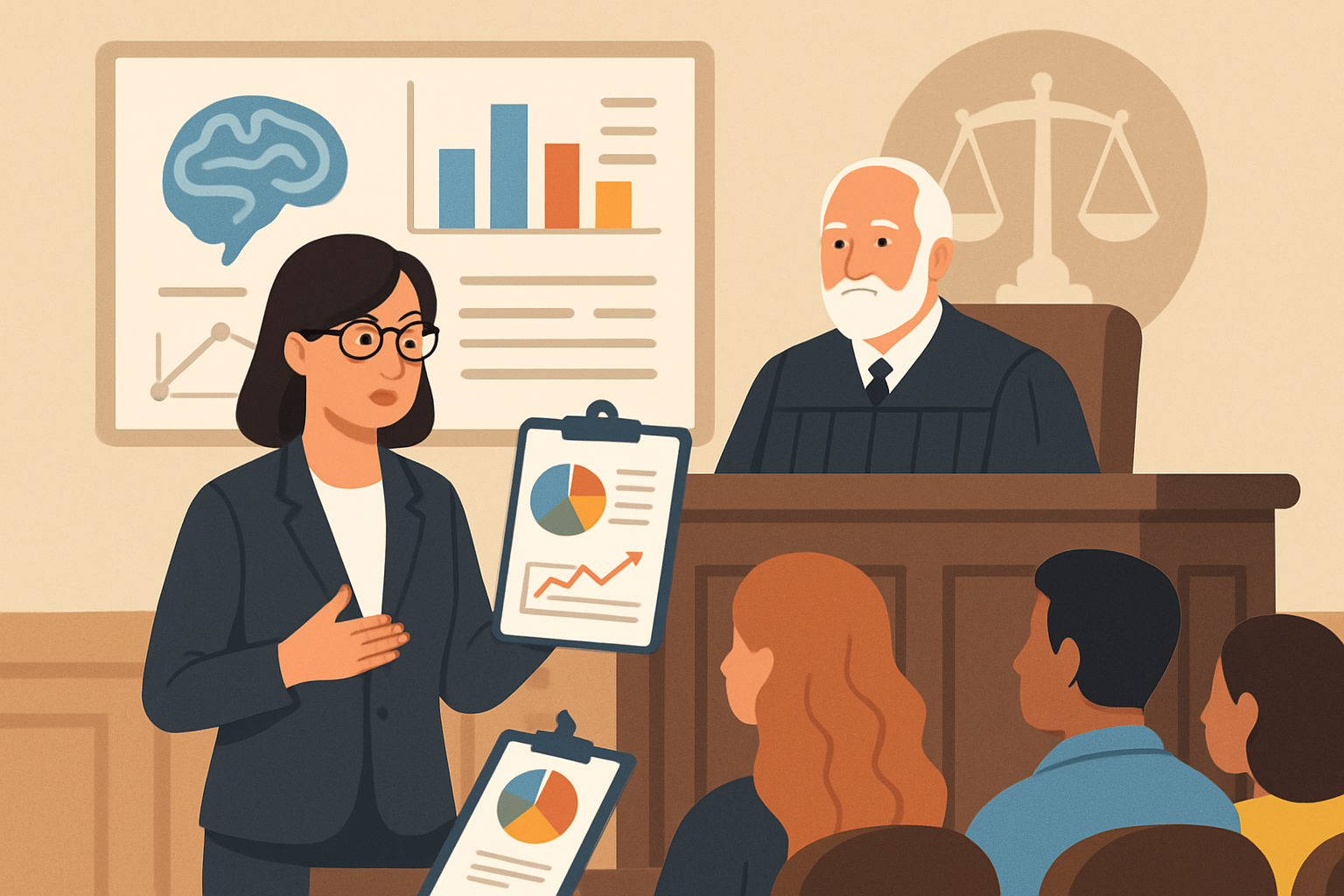
Why Do People Use Mental Gymnastics to Avoid the Truth
Mental gymnastics are complex thought processes people use to avoid uncomfortable truths. Discover w...
Forensic psychology is a fascinating field that marries psychology with the legal system and aims to shed light on human behavior when the law is involved. Forensic psychologists bring their psychological know-how to the courtroom and beyond to help courts and legal pros by evaluating individuals, offering expert opinions and aiding in tough decision-making. Their work spans criminal cases, civil disputes and correctional systems. They break down complex psychological matters into language the law can actually use.
The overlap between psychology and law might seem tangled at first glance but forensic psychologists play vital roles that shape court decisions, deepen legal understanding and champion justice.
Forensic psychology is the branch of psychology that applies its principles and techniques to tackle the tricky questions and challenges within the legal system. It focuses on understanding the people involved in legal cases and assessing their mental states. It provides insights that help courts, lawyers and law enforcement make well-informed decisions.
Clinical psychology mainly focuses on diagnosing and treating mental health issues. Forensic psychology tackles questions that arise within the legal system. For instance, a clinical psychologist might help manage anxiety or depression. A forensic psychologist usually assesses whether a defendant is fit to stand trial or gauges the chances they might reoffend.
When it comes to the legal system, forensic psychologists wear quite a few hats, often juggling roles that require not just expertise but a fair bit of finesse. These professionals dive deep into the psychological factors behind legal matters, aiming to shed light on complexities that might otherwise remain in the shadows. Their responsibilities range from evaluating the mental state of defendants (and yes, sometimes that means reading between the lines of courtroom drama) to providing expert testimony that can sway decisions in subtle but powerful ways. In essence, they are the go-to specialists who bridge the gap between the nuances of human behavior and the rigid framework of the law.
Forensic psychologists wear many hats within the legal system. Most often, you will find them conducting psychological assessments and weighing in with expert testimony in court. They team up with lawyers for consultations, help pick juries, evaluate competency, and recommend treatment or rehabilitation strategies. By juggling these roles they bring clarity to the tangled psychological issues involved and help everyone from judges to jurors get a better grip on what is really going on—often leading to fairer and more accurate outcomes.
When it comes to understanding the mind, psychological evaluations and assessments are the go-to tools. They might sound a bit clinical, but in reality, they’re like the mental equivalent of a thorough health check-up—shedding light on what’s happening beneath the surface. Whether it’s figuring out a diagnosis, planning treatment, or just gaining some clarity, these assessments help piece together the puzzle that is human behavior. And let’s be honest, everyone’s a little puzzling now and then.
One of the main hats forensic psychologists wear is conducting psychological evaluations that play a important role in legal decisions. This usually means figuring out whether a defendant truly understands the court proceedings and digging into claims of insanity. It also means sizing up the risk that someone might offend again. These evaluations offer the court valuable windows into a person’s mental state and capabilities.
Forensic psychologists use a handful of tools and techniques when conducting their assessments. These include clinical interviews, standardized tests like the MMPI (Minnesota Multiphasic Personality Inventory) and keen observations of behavior. They carefully sift through this information to craft clear evidence-based reports that judges and lawyers can easily understand.
Forensic psychologists often step into the courtroom spotlight as expert witnesses tasked with presenting their findings clearly and fairly. Their role is to unpack complex psychological concepts and assessments and make them digestible for judges and juries. This translation is important because it helps the legal system understand evidence related to someone’s mental health or behavior.
"Forensic psychologists do their best to marry solid scientific knowledge with the often complex world of legal requirements, aiming to offer testimony that upholds justice without slipping into bias or relying on guesswork. It is a careful balancing act, really."
Alongside conducting evaluations and offering testimony, forensic psychologists frequently collaborate with lawyers, judges and law enforcement. They play a key role in crafting case strategies and breaking down psychological evidence in a way that makes sense. They also shed light on mental health issues that pop up in legal settings.
Forensic psychologists help attorneys untangle a defendant's mental health issues and highlight factors that might lighten their load. In civil matters, they offer insights on custody battles or discrimination claims to show how psychological factors shape actions and decisions. They also work with law enforcement, giving advice on interrogation techniques and managing crisis situations.
Forensic psychologists often step in to lend a hand during jury selection by digging into the attitudes and decision-making habits of potential jurors. This practice, known as jury profiling, helps attorneys zero in on jurors who might lean sympathetic or at least stay neutral
Their knack for grasping group psychology and social influences often gives them a leg up when it comes to predicting how juries might perceive evidence or testimony. This kind of expertise doesn’t just sit on the sidelines—it actively shapes how a case is presented.
When it comes to treatment and rehabilitation, a tailored approach often works wonders. It is not just about following a strict protocol but understanding the individual behind the condition. Whether it is hands-on therapy, medication, or lifestyle tweaks, the key is finding that sweet spot that fits like a glove. Remember, progress might not always be a straight line—sometimes it is a bit of a rollercoaster, and that is perfectly okay. Patience and persistence truly make all the difference in the long run.
Forensic psychologists often step in to recommend the best treatments or rehabilitation plans for offenders or those caught in legal cases. They look closely at mental health needs and risk factors and weigh the pros and cons of options like counseling, medication or behavioral therapy.
Courts often lean heavily on these recommendations when deciding sentences, parole and other options.
Getting the right training and qualifications is often the cornerstone of success in just about any field. It’s not always a straight path—sometimes you have to roll up your sleeves and dig in before things start clicking. Whether you’re stepping into a new career or sharpening old skills, knowing what’s required can smooth the path forward and help you sidestep avoidable bumps. After all, the right credentials aren’t just a piece of paper; they’re a ticket to confidence and competence that can open doors you didn’t even know were there.
Becoming a forensic psychologist requires a solid educational foundation and focused training. Typically, the journey starts with undergraduate studies and moves on to graduate specialization. Then you dive into supervised clinical practice, licensure and maybe some extra certification or training tailored specifically to forensics.
There are quite a few misconceptions floating around about forensic psychologists, many of which stem from the way they’re portrayed in movies and TV shows. Some people seem to think these professionals have a knack for reading minds or that their job is all about dealing solely with criminals. Forensic psychologists wear many hats and lean heavily on careful scientific assessments and solid ethical guidelines.
Knowing what forensic psychologists can realistically do helps us appreciate their true value and keeps us grounded about the limits of psychology in legal contexts. Their role is to offer insight and clarity—not to make tough calls or predict the future, which is a relief honestly.

Forensic psychology plays a key role in the legal system by offering objective psychological insights that help keep trials fair and grounded in solid evidence. This specialized field shines a light on the tangled web of human behavior and mental health issues while helping courts make sense of it all.
Several notable cases have shown just how much forensic psychological evaluations can tip the scales in courtroom verdicts, demonstrating exactly what do forensic psychologists do. More often than not, they shed light on a defendant's mental state during trial or offer recommendations that guide sentencing toward rehabilitation rather than just punishment.

Mental gymnastics are complex thought processes people use to avoid uncomfortable truths. Discover w...

Explore linear perspective psychology to understand how your mental viewpoint influences emotions, d...

Learn advanced tips and expert techniques to help young athletes build mental toughness, stay focuse...

Contempt is a toxic emotion that can erode love and respect in relationships. Discover what contempt...